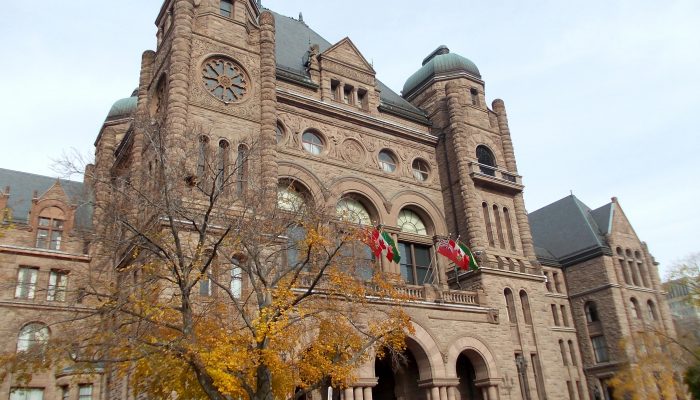
Preserving Ontario’s documentary heritage – one annual report at a time
Historical government information
Government documents are primary source materials which form an important part of our documentary heritage. Over recent years, the resources allocated to building and preserving tangible-format collections of government information have decreased at many institutions. At the same time, a decrease in the footprint available for shelving and storage to make way for more user-centered spaces in libraries has put pressure on print collections of all sorts. This evolution has put government information in a particularly vulnerable position for several reasons, including a lack of departmental archiving, the limited distribution of tangible-format materials, and a limited market for the redistribution of older print publications. As a result, it is imperative to develop and implement strategies aimed at improving access to, and ensuring the preservation of, these materials. Although digitization alone does not fully address the issues of preservation or access, it plays a key role in helping to safeguard the content of these at-risk publications before they disappear. It also supports online research and teaching initiatives.
OCUL Government Information Community
The Ontario Council of University Libraries (OCUL) is a consortium of Ontario’s 21 university libraries. The OCUL Communities serve many functions. They provide forums for the exchange of ideas related to specific services or types of information, they promote collaboration between OCUL institutions, and they provide opportunities for individual librarians and staff at OCUL institutions to propose, advance, or contribute to initiatives benefiting the consortium as a whole.
The OCUL Government Information Community (OCUL-GIC) brings together people from OCUL member institutions and external partners who have roles related to or interest in supporting the preservation of and access to tangible-format and born-digital government materials produced by both the Ontario provincial and Canadian federal governments. OCUL considers proposals for new initiatives throughout the year and provides the opportunity for its communities to propose projects that have budget and staffing implications as part of OCUL’s annual budget planning cycle.
The possibility of requesting OCUL funding to launch an OCUL-GIC digitization project seemed like the perfect opportunity to address some of the preservation and access issues described above. The Ontario government publications distributed to and collected by OCUL libraries has, over time, made OCUL libraries a collective, de facto archive of this historical collection, and thus, an important source of target materials for this initiative.
Implementation
Putting digitization plans into practice was driven by a small subgroup of the OCUL-GIC, with coordination done remotely from Queen’s University and on-site representation from University of Toronto Libraries, Internet Archive Canada (IAC), Scholars Portal, and OCUL.
Although government publications are often produced for consumption by the public at large, copyright remains with the Crown. As such, our first step was to identify a list of possible titles to be scanned and then to obtain permission for the documents to be digitally reproduced and distributed. For our proposal, we were able to complete these steps for three candidate publications:
- The Ontario Government Publications Annual Catalogue;
- The Annual Report of the Ontario Department of Reform Institutions and Department of Correctional Services; and
- The Annual Report of the Ontario Ombudsman.

The Annual Catalogue is particularly significant as a record of the published output of the Government of Ontario between 1972 and 1996. These years immediately precede the start of the transition to electronic publishing by many governments, and are often overlooked when identifying high-value targets for historical digitization projects.
Next we needed to determine what inputs would be required by IAC in order for them to complete their work. We split up these responsibilities such that payment and administrative paperwork were coordinated by the OCUL office, metadata was generated and submitted by the subgroup coordinator, and the collection and transportation of materials to be digitized was done by our member at the University of Toronto, who had also been instrumental in obtaining the required copyright clearances.
While having a large collection of potential source materials in the same building as IAC has been convenient, we have also had to rely on other sources for items with bindings more appropriate for digitization or for those not held at the University of Toronto’s Robarts Library. The Ontario Legislative Library has been very helpful in this regard.
Going Forward
Project implementation is ongoing, but some of the fruits of our labour are already available on the Internet Archive site. The documents digitized though this project are collected together under the heading Ontario Council of University Libraries Government Information Community (GIC). This year’s project has focused on digitizing the three titles mentioned above, but plans are in the works to expand this important initiative. In September, we submitted a funding proposal for the 2017-18 fiscal year to continue digitizing historical Government of Ontario publications. We have already received copyright clearance for a large and diverse collection of historical publications from the Ontario Ministry of the Attorney General.
Our project illustrates one of the ways in which shared challenges can be met by organizations partnering to find a solution. We hope that our efforts in collaboration with OCUL, IAC, other libraries, and government author institutions will help to improve the public access, discovery, and digital preservation of these important resources that form a part of our collective documentary heritage.
Graeme Campbell is the Open Government Librarian at Queen’s University. He can be reached at graeme.campbell[at]queensu.ca.
Catherine McGoveran is the Government Information Librarian at the University of Ottawa. She can be reached at catherine.mcgoveran[at]uottawa.ca.
Catherine and Graeme are the Co-Moderators of the OCUL Government Information Community.


